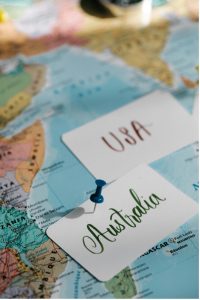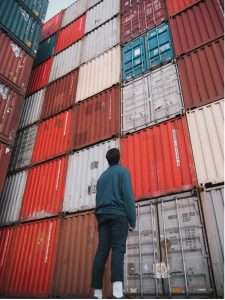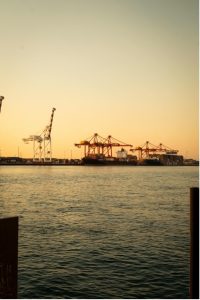
Australia Braces for Impact of Trump’s Global Tariff Shock
Sydney, May 2025 – Australia is facing a new wave of trade uncertainty after U.S. President Donald Trump announced sweeping global tariffs on imports. The controversial move has unsettled markets and governments worldwide. For Australians, the tariff shock raises urgent questions about the economy, jobs, and the future of the rules-based trading system that the country relies on.
Trump’s decision marks a dramatic shift in U.S. trade policy. Unveiled as part of his renewed “America First” agenda after returning to the presidency in 2025, the plan imposes a baseline 10% tariff on all imported goods, with even higher rates on certain countries. It is one of the most far-reaching protectionist measures by the U.S. in decades. Trump claims the tariffs will protect American industries and reduce trade deficits, but allies like Australia – which enjoys a free-trade agreement with the U.S. – have been caught off guard.
Pexels by Lara Jameson (free stock photo)
Trump’s 2025 Tariff Gambit
In early April, Trump stunned global markets and partners by announcing tariffs on virtually every import into the United States. Every product entering U.S. ports would face at least a 10% tax, and some nations (such as China and Japan) would see even steeper duties. Australia wasn’t singled out for extra punishment, but its exporters will still be hit by the 10% baseline tax despite years of zero-tariff access under the Australia–U.S. Free Trade Agreement.
Trump argues that the sweeping tariffs will bring manufacturing jobs back and stop other countries from taking advantage of the U.S. However, many economists warn the move could backfire – raising costs for American consumers and sparking a global trade war. The announcement immediately sent stock markets tumbling as investors feared trade disruption. Australian officials, recalling the volatility of Trump’s 2018 trade war, are alarmed by the prospect of history repeating and the potential fallout for Australia’s economy.
Australian Government Responds
Canberra’s reaction to Trump’s tariff surprise has been firm but measured. Prime Minister Anthony Albanese slammed the move as “totally unwarranted” and called it “not the act of a friend.” He made it clear Australia will not retaliate, avoiding a trade war that would hurt Australian consumers.
Trade Minister Don Farrell has been lobbying U.S. officials for a change of heart. Farrell argues that penalizing Australia – a close ally that buys more from the U.S. than it sells – makes little sense. He is urging Washington to reconsider the plan and seeking exemptions for key Australian exports. “We will continue pushing the U.S. to drop these tariffs entirely,” Farrell said, emphasizing that the policy hurts friends and foes alike.
Australia is also discussing collective action with other affected nations and weighing a formal complaint with the World Trade Organization. In the meantime, Australian beef, wine and other products are suddenly about 10% more expensive for American buyers. The government has vowed to support exporters and work to soften the blow of any trade losses.

Pexels by Pat Whelen (free stock photo)
A Student’s View Amid Trade Turmoil
Beyond the halls of Parliament, Australians remain anxious—including young people soon entering the workforce. Michelle (a pseudonym), a 22-year-old Public Relations student at the University of Sydney, shares these concerns. Originally from Perth, a mining hub heavily reliant on Asian trade, she questions the logic behind Trump’s tariffs.
“I get that trade wars are extreme negotiating tools,” Michelle says. “But ordinary people often bear the costs, and I doubt what ‘victory’ even means here.” She believes following America blindly could hurt Australia, particularly given Perth’s economic ties with China. “Our geographic reality points toward Asia, not Washington,” she argues, expressing frustration with Canberra’s cautious stance.
Industries and Jobs at Stake
Across Australia, export-focused industries are bracing for the impact. The United States is a key market for certain sectors of Australian trade. Beef exporters say a 10% price hike could wipe out their already slim profit margins in the competitive U.S. market. Winemakers, too, worry their wines will become less competitive if American consumers turn to cheaper local options instead of Australian imports.
Manufacturers and miners could feel the squeeze as well. Australian companies supply raw materials and components to U.S. factories, and new trade barriers could jeopardize those contracts. Resource industry groups warn that prolonged global trade disruptions might drive down commodity prices and cost jobs in mining regions. Manufacturers, meanwhile, fear the uncertainty will cause firms to delay investments or expansion plans.
All told, trade-related sectors – from farms and wineries to mines and factories – employ hundreds of thousands of Australians. Any sustained export downturn could translate into fewer shifts and lost jobs at home. Economists also caution that tit-for-tat tariffs tend to raise the cost of imported machinery and parts, squeezing local businesses’ profits. In short, this tariff turbulence threatens to put pressure on both economic growth and workers’ livelihoods, at least in the short term.

Pexels by Nate Biddle (free stock photo)
Long-Term Implications
In the longer run, Trump’s tariff offensive raises deeper questions about Australia’s economic strategy. After decades of U.S.-led free trade bringing low tariffs and clear rules, that foundation is now being shaken. Policymakers in Canberra may need to double down on diversifying trade partnerships – strengthening ties with Asia, Europe and other markets – so Australia isn’t overly reliant on any single country or on Washington’s leadership.
Strategically, the tariff clash comes as Australia balances its security alliance with the U.S. against its important economic relationship with China. If global trade splinters into rival blocs or protectionism becomes the new norm, Australia could face tough choices. Some experts say this upheaval should spur Australia to invest more in self-sufficiency and innovation, making the economy more resilient to external shocks.
For now, there’s a glimmer of relief: a U.S. court has temporarily blocked Trump’s most extreme tariffs. That news lifted the Australian stock market and heartened exporters, but uncertainty prevails. Even if Trump’s tariff plan is pared back, the episode has been a jolt – showing how quickly global trade stability can unravel and how vulnerable Australia is to policy shifts in Washington.
As this trade drama continues, Australians watch with both anxiety and resolve. The hope is that diplomacy will prevail over economic nationalism. Trump’s tariff gambit has tested Australia’s resilience; in response, the nation stands by its free-trade principles while moving to protect its interests. The coming months will reveal if those efforts are enough to shield Australians from the tariff saga’s fallout.
- https://edition.cnn.com/2025/04/02/politics/trump-global-tariffs-announcement/index.html
- https://www.abc.net.au/news/2025-04-03/albanese-condemns-trump-global-tariff-move/101517310
- https://www.dfat.gov.au/trade/resources/trade-statistics/Pages/trade-statistics
- https://www.afr.com/policy/economy/us-australia-beef-trade-dispute-explained-20250405-p5a2c1
- https://home.kpmg/au/en/home/media/press-releases/2025/04/trump-tariffs-impact-australia-economy.html


Be the first to comment